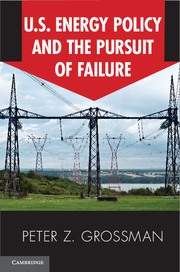9 - Modesty
Published online by Cambridge University Press: 05 March 2013
Summary
Out of the crooked timber of humanity no straight thing was ever made.
– Immanuel Kant (1784)Markets
What happens to U.S. energy policy when government is too confused to act or when it acts precipitously and fails? The answer is that policy reverts to a default position. Government effectively lets energy markets decide.
I would emphasize the word “markets,” plural; although the rhetoric of policy switched years ago from fuels to energy, in reality, there is no one energy market and no single policy that would encompass all energy fuels and technologies coherently. In fact, too often, politicians conflate oil policy with energy policy – and come to illogical conclusions as a result. For example, even in recent years, officials have claimed that more nuclear power would lessen U.S. dependence on foreign oil, even though nuclear energy is used only to generate electric power, and, since the 1990s, little oil is used to produce electricity.
In reality, the world market for oil is quite distinct from the mostly domestic market for natural gas,1 and both are quite different from markets for coal or electric power. To an extent, fuels markets are related, especially when there are substitution opportunities between them (e.g., coal and natural gas in electric generation; oil and natural gas in petrochemicals). But each fuel, each technology has its own dynamics, its own social spillovers, its own history, its own legacy of both market imperfections and government interventions.
- Type
- Chapter
- Information
- US Energy Policy and the Pursuit of Failure , pp. 330 - 354Publisher: Cambridge University PressPrint publication year: 2013

